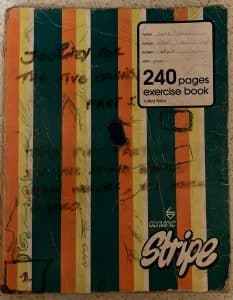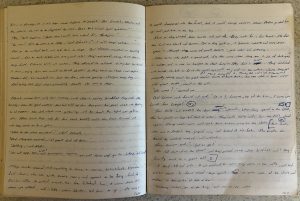The Novel Dream
I wanted to write a novel.

I wanted to create my own fantasy epic.
But I was only 15 and had no idea what I was doing, so all my planning consisted of was buying an A5 exercise book. (I was at my parents’ last week and scrounging around in the garage looking for something else entirely, and actually found the exercise book – right.)
I’d stay up nights, pumping myself full of cups of tea and cigarettes, scribbling away while one of the midnight music shows of the time, like Rage, played in the background.
The exercise book (and its successor) even accompanied me when my parents took me to Canada and Greece in 1987.
The story was a patchwork cannibalisation of things like the Arthurian holy grail legend (but made a lot less sense) and The Lord of the Rings; there were wizards, kings, men, elves, and a matriarchal Amazonian-like race (so I was at least original there for 1985 or so); a lot of formality in the prose; “grim-faced” characters, “fair elves” (ripping all this from Tolkien); and, naturally, a big bad enemy – the former head of the wizards, who’d gone heel for no real reason other than he wanted more power.
The more I think about it, the stupider (and hideously impromptu) the plot seems – crowns that brought life and hope to the people and the land, and which had been lost and needed to be recovered to battle the rise of the Nercromancer; and an heir descended from the royalty of all the primary races (the Men, Elves, Dwarves, and the Amazonian-like race, called Goraylans) who had to be located because only he could wear the fifth crown.
Then the story was meant to break into secondary quests in the following book – stuff I’d nowadays label as “pointless busy work” to keep characters occupied while the real story unfolded elsewhere (although as I try to reflect on that, I can’t recall what that might’ve possibly been outside of the final conflict).
But it all seemed golden back then. It was the only thing I wanted to do. And it taught me (as a byproduct of writing) to stick with something and finish it.
That’s one thing with writing – a lot of inexperienced writers, or non-writers, think it’s this glamorous, romanticized vocation. Inexperienced writers don’t get it when it becomes work. They think it’s meant to be magical the whole way, a series of inspirations popping like a string of firecrackers to produce one final big bang.
Thomas Edison is accredited with saying, “Genius is one percent inspiration, ninety-nine percent perspiration.” (I don’t know if he did actually say this or it’s erroneously been accredited to him; apparently, the internet isn’t quite the purveyor of truth some believe it is.)

Anyway, that quote sums up writing – even when it’s not genius.
I wrote the exciting bits (the battles, the revelations, etc.) and pushed myself through what some would consider the drudgery – the bits in-between.
When I look through the exercise book now, I see I’ve scribbled numbers throughout that count up sequentially – I have no memory of doing this, but can only imagine that at some point I annotated it, including backstory or something in some other exercise book (that I’ve yet to locate).
That was happening in Tolkien collections released at the time, like The Book of Lost Tales and Unfinished Tales. These were books Tolkien’s son, Christopher, had collated, and comprised Tolkien’s early drafts, snippets of scenes (such as Gandalf explaining why he chose Bilbo for the quest in The Hobbit – it was because Bilbo’s scent would confuse Smaug, who’d never smelled a Hobbit), and self-contained complementary material. Tolkien was such a hero of mine that I had to emulate him, had to imagine I was going to be the next Tolkien, even if I only had an iota of his talent, intellect, and knowledge.
I didn’t know that, though. Ignorance is bliss. For me, it was all fun – building this story, the universe, and the characters who populated it all.
Before I knew anything about the submission process, before I experienced my first rejection, before concerns about sales and reviews and reputation, before mental health issues became a constant companion, before I wanted to punch certain reviewers heads in, before everything,there existed only this pristine investment in the writing, in the love of doing it, and the dream of making something grand.
I was a naïve and there was an unsullied beauty in that can never be replicated.